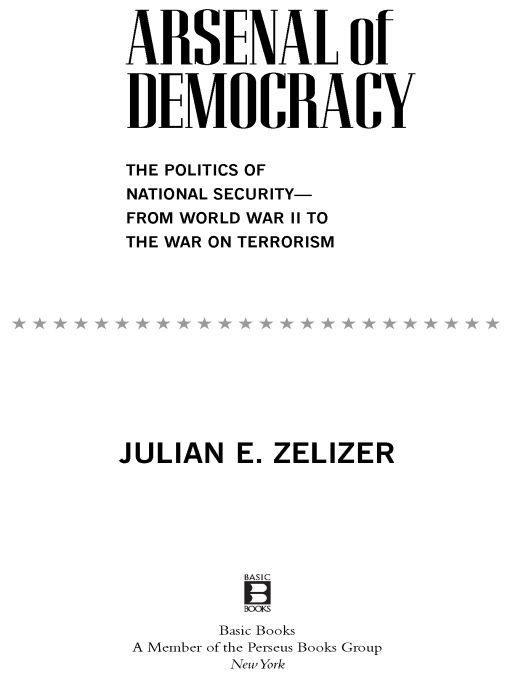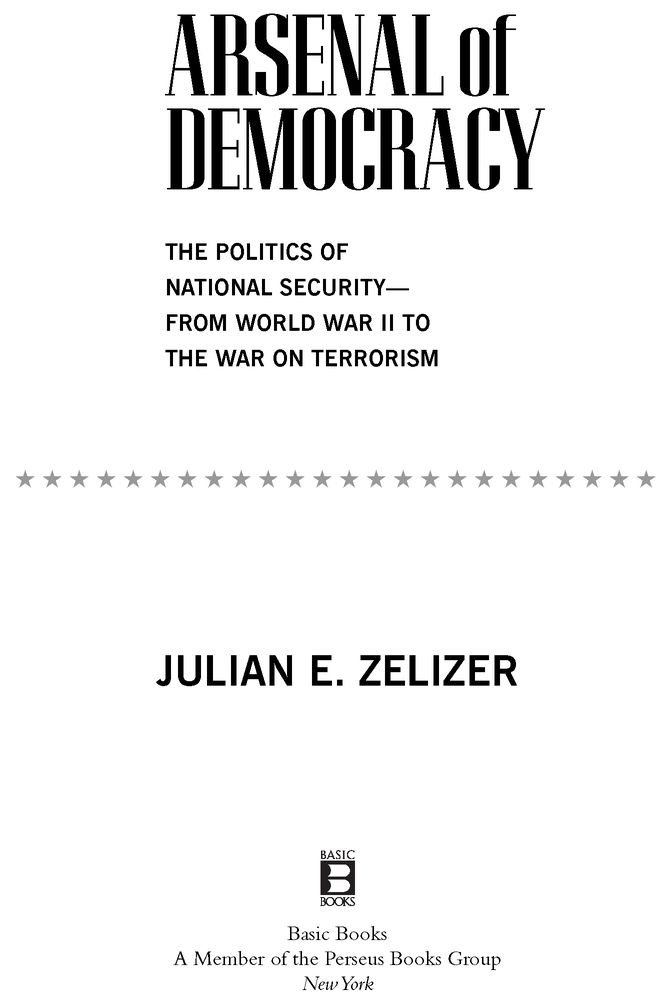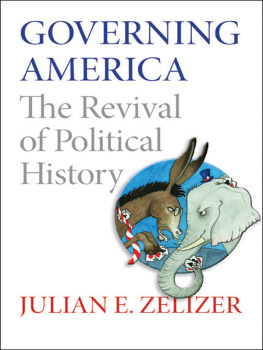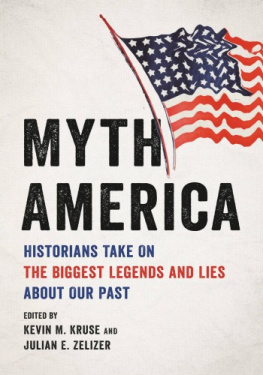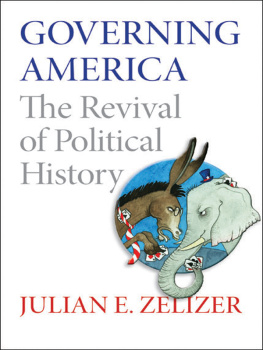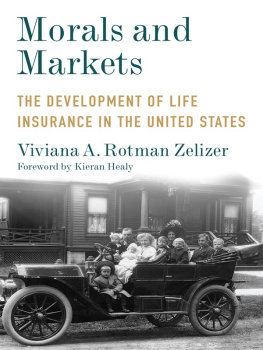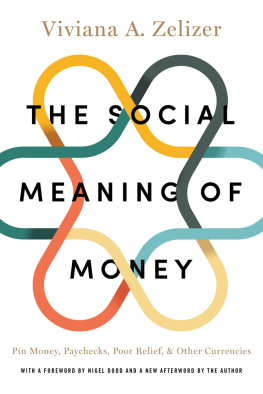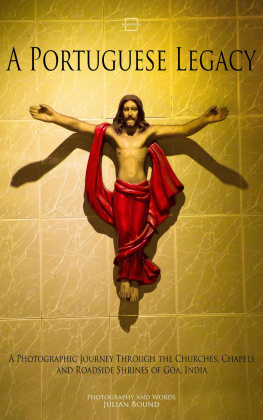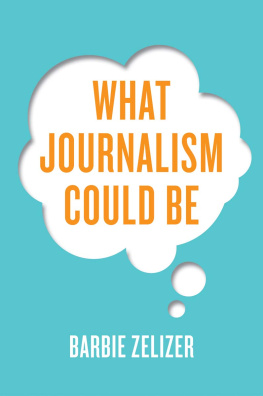Table of Contents
Praise for Julian E. Zelizers Arsenal of Democracy
Arsenal of Democracy is a myth-shattering history of the American national security state since 1945. Zelizer sheds important new light on the fiercely debated issues of the postwar era, and amply supports his core argument: in the United States, foreign policy is always a political matter. A marvelously instructive work.
Frederik Logevall, Professor of History, Cornell University, and co-author ofAmericas Cold War: The Politics of Insecurity
Extensively researched and vigorously argued, Arsenal of Democracy uncovers the intimate and complex interactions between domestic politics and national security policy in the post-World War II period, exploding the old saw that politics stopped at the waters edge. Ranging over half a century, this ambitious book sets the standard for understanding the politics of national security policy in modern America.
Bruce J. Schulman, William E. Huntington Professor of History, Boston University
Arsenal of Democracy provides a provocative, timely and compulsively readable account of the vexed relationship between foreign and domestic policy and the tangled politics of national security since World War II.
Laura Kalman, Professor of History, University of California, Santa Barbara
Many Americans imagine a past era of bipartisan cooperation in our country around critical issues of war and peace. Zelizer shows that such a golden age never existed in our nations politics. Instead, Democrats and Republicans have used foreign policy debates since World War II to push their partisan agendas and their electoral interests. Zelizer does not criticize this process, but he reminds us that successful foreign policy always requires effective manipulation of interests, fears, and aspirations at home. Zelizer offers a compelling account of how foreign policy is really made. Every citizen interested in understanding our nations policies would benefit from reading this well-written book.
Jeremi Suri, E. Gordon Fox Professor of History, University of Wisconsin
To Sophia and Nathan Zelizer, Two Beautiful People
FOUR QUESTIONS
ON THE EVENING of December 29, 1940, Franklin Delano Roosevelt made one of the most important speeches of his presidency. Over his nearly eight years in office, with his Fireside Chats, he had used radio, the eras major medium of mass communication, to explain his policies to the American people. This time, he began: This is not a fireside chat on war. It is a talk on national security, because the nub of the whole purpose of your President is to keep you now, and your children later, and your grandchildren much later, out of a last-ditch war for the preservation of American independence and all of the things that American independence means to you and to me and to ours. Germany, Italy, and Japan were growing in military strength. While Congress had constrained the presidents ability to take action, Britain was left standing alone to fight fascist aggression. FDR said that the country needed to prepare for war.
The president warned listeners that the Nazi masters of Germany have made it clear that they intend not only to dominate all life and thought in their own country, but also to enslave the whole of Europe, and then use the resources of Europe to dominate the rest of the world. Calling on Americans to support the production of munitions and supplies that could be sent to the British to assist them in their war against Germany, so that the nation could avoid having to fight in the war, he said, We must be the great arsenal of democracy. He concluded,
I have the profound conviction that the American people are now determined to put forth a mightier effort than they have ever yet made to increase our production of all the implements of defense, to meet the threat to our democratic faith.
As President of the United States I call for that national effort. I call for it in the name of this nation which we love and honor and which we are privileged and proud to serve. I call upon our people with absolute confidence that our common cause will greatly succeed.
The national security address, as the White House called it, had the largest radio audience in history to that time, reaching Europe and the Far Eastand was heard by three-quarters of the American people. Though the speech took place on the same night that the Germans conducted a massive air raid on London, Britons were heartened by what they heard. Londons financial markets rallied.
When FDR spoke about the great arsenal of democracy, he was thinking primarily about the production of weapons in cities such as Detroit to be sent to an ally. What that arsenal grew into over the next decade, during World War II and the early years of the Cold War, would become something much more immense, a complex network of institutions, policies, ideologies, and political commitmentsthat is, a permanent national security state. Its central components were the Central Intelligence Agency (CIA); the Federal Bureau of Investigation (FBI); the National Security Council (NSC); the National Security Agency (NSA); the Atomic Energy Commission (AEC); a vastly enhanced navy, army (with a permanent draft), and air force; international financial assistance programs; autonomous congressional committees; and a sizable national defense budget. An expanded mass income tax enacted during World War II financed these programs as the number of taxpayers grew from 3.9 million in 1939 to 42.6 million in 1945. Moreover, the national security state was built on the foundation of an ideological commitment to continual engagement overseas, through diplomacy, war, and covert action.
The attempt to maintain an arsenal of this size would create huge and pervasive tensions and shape American politics well into the twenty-first century. The arsenal and the democracy posed threats to each other. For the national security state, the challenge was whether sound policy could be made about war and peace despite the pressures that naturally emanated from a free electoral system with parties, elections, and interest groups. For democracy, the challenge was whether the presence of a permanent national security state would create an insulated elite of policy makers who made decisions outside the political process.
FOUR CENTRAL QUESTIONS about national security and American politics have kept recurring since World War II. They have never been definitively answered, nor is it likely they will.
DOES CONGRESS OR THE PRESIDENT DRIVE NATIONAL SECURITY POLICY?
As national security became a permanent policy challenge at home and abroad, the centralized nature of the executive branch and the presidents constitutional responsibility as commander in chief created more support for placing authority in his hands. The creation of the CIA, NSC, and NSA during the Cold War vastly expanded the executive bureaucracy. Presidents refined their public relations operations and more aggressively used the bully pulpit of the White House to influence public opinion on war and peace. Most importantly, beginning with President Trumans decision to send troops into South Korea in the summer of 1950, presidents felt freer to enter into overseas conflicts without a formal declaration of war.

